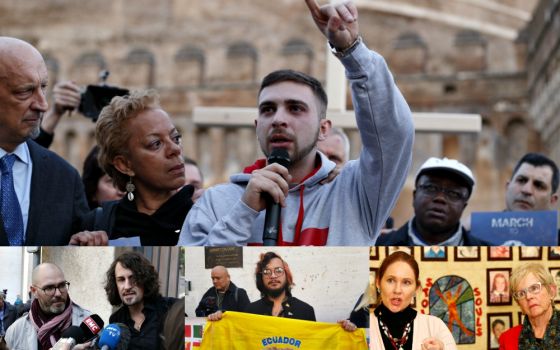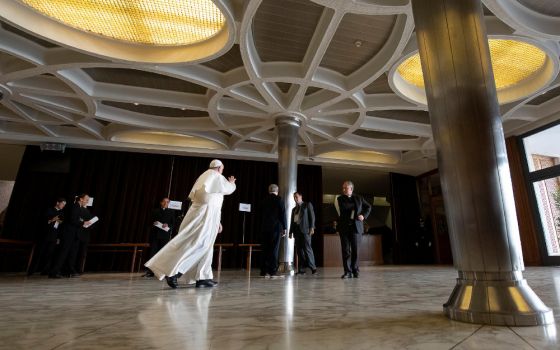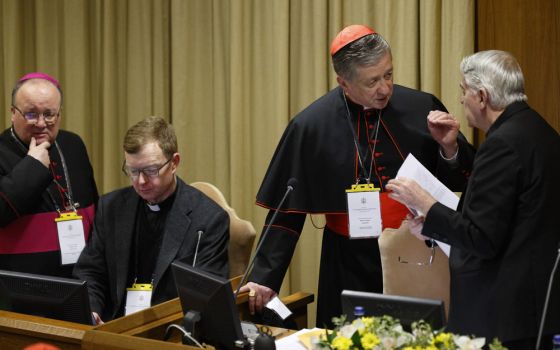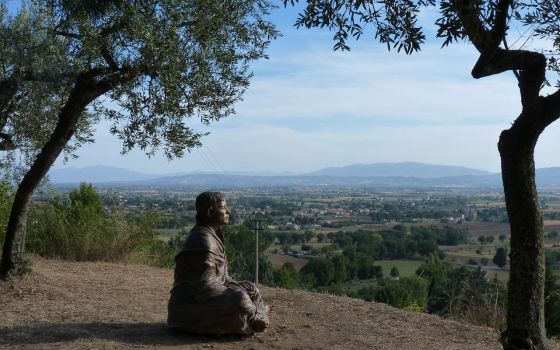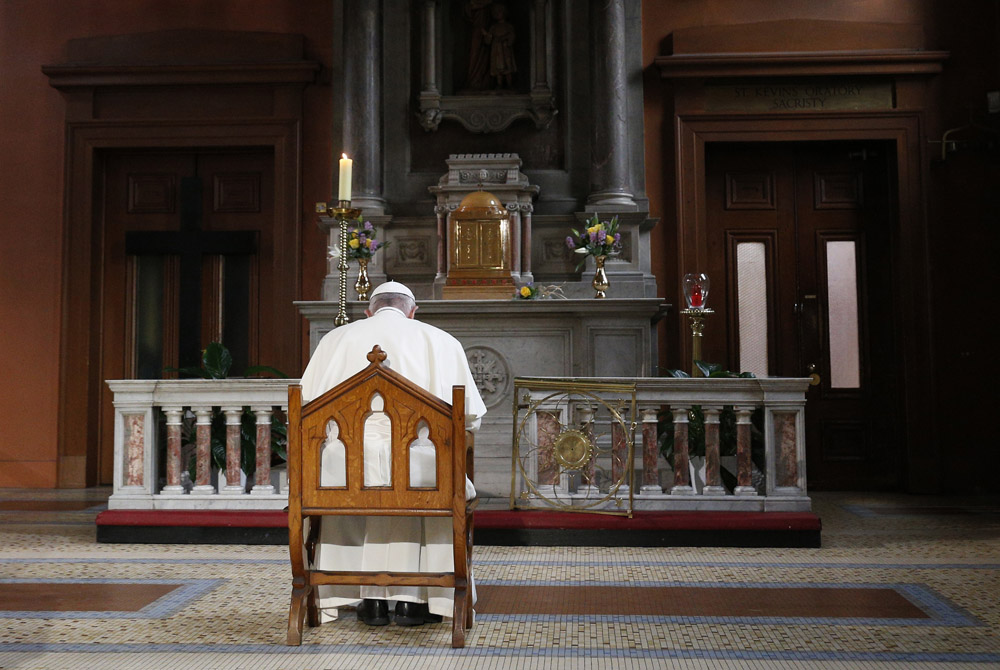
Pope Francis prays in front of a candle in memory of victims of sexual abuse as he visits St. Mary's Pro-Cathedral in Dublin Aug. 25, 2018. (CNS/Paul Haring)
Editor's note: Jason Berry was the first to report on clergy sex abuse in any substantial way, beginning with a landmark 1985 report about the Louisiana case involving a priest named Gilbert Gauthe. In 1992, he published Lead Us Not into Temptation: Catholic Priests and the Sexual Abuse of Children, a nationwide investigation after seven years of reporting in various outlets. In the foreword, Fr. Andrew Greeley referred to "what may be the greatest scandal in the history of religion in America and perhaps the greatest problem Catholicism has faced since the Reformation."
Berry followed the crisis in articles, documentaries, and two other books, Vows of Silence: The Abuse of Power in the Papacy of John Paul II (2004) and Render unto Rome: The Secret Life of Money in the Catholic Church (2011), which won the Investigative Reporters and Editors Best Book Award. Given the current moment and its possibilities and the fact that Berry is singular in his experience covering the scandal from multiple angles, NCR asked if he would write a reflection on the matter as the church's bishops are about to gather in Rome to consider the issue. Below is the first of three parts.
As the heir to disastrous mistakes of John Paul II and Benedict XVI in their handling of the clergy sex abuse crisis, Francis is an existential pope, trying to chart a way out of the long, aching scandal by forging standards where few exist.
The upcoming meeting of the heads of bishops' conferences from around the world is the latest evidence that what was once considered the scandal of "a few bad apples," or the result of Western permissiveness, or hostile, anti-Catholic media is, in fact, a pathological sickness eating through the church's clerical and episcopal culture. The scandal has gone global. Prosecutors in several countries have church officials under scrutiny for helping predators evade criminal prosecution.
The "cases" are often old. But as we saw in the Pennsylvania grand jury report, church officials showed Olympian insensitivity to victims, while abetting a criminal sexual underground. Survivors, like the chorus of a Greek tragedy, warn of a moral order being broken.
How did the crisis reach this stage? What feasible reforms can the pope engineer?
An entire generation of Catholics in North America, Ireland and Australia has grown up since the late 1980s' early wave of reports on bishops' recycling of child molesters. Media coverage accelerated in the early 1990s, then ebbed, but surged back when The Boston Globe series in 2002 ignited a chain reaction of media coverage for several years. Last summer, the McCarrick scandal and the Pennsylvania grand jury report fed a resurgence, now more focused on Pope Francis and what he intends to do about it.
The unswerving story line remains the cover-up of sex offenders, as dioceses and religious orders, belatedly, post names of perpetrators. Some are dead, the cases "old," but the scope of betrayal is stunning. Longtime resistance of Catholic prosecutors in major metropolitan areas has given way to a general Catholic outrage, emboldening police and prosecutors. This is a continuing clash between monarchy and democracy: the church under the pope, as supreme arbiter of canon law, keeps bending to a free press and a court system with subpoena power over secret files.
The Vatican never anticipated that the sheer weight of details about sexual behavior of all kinds in a supposedly celibate culture would spill out, or that callous tactics of concealment would feed the furnace of 24/7 news.
Francis, too, has blundered on the issue tearing at the church's central nervous system. As the cardinal of Buenos Aires, he approved funding a defense lawyer's report for Fr. Julio Grassi, a convicted pedophile. The document tried to discredit the victims but backfired when Argentina's Supreme Court upheld the 15-year conviction.
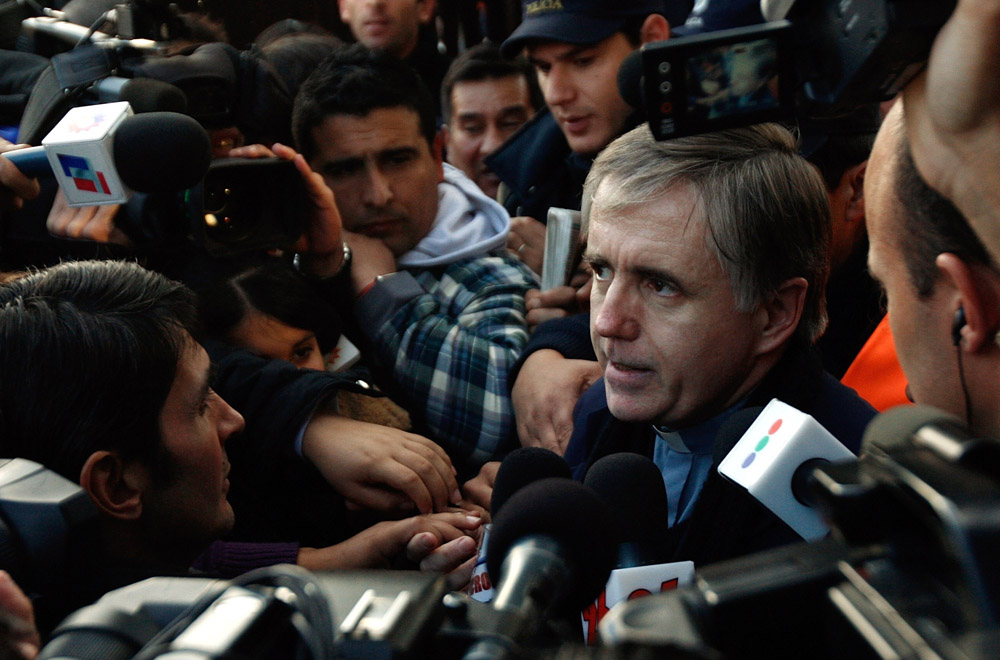
Fr. Julio Cesar Grassi talks to journalists June 10, 2009, after leaving a courtroom in Moron, Argentina. The well-known Argentine priest who had operated a program for troubled youths, was sentenced to 15 years in prison for one count of sexual abuse and one count of corrupting a minor. (CNS/Marcos Brindicci, Reuters)
Many bishops are reporting clerics to the police when allegations arise; but what they do with problem priests is symptomatic of a culture that cannot change without the oversight that comes with a true separation of powers. Former Duquesne University law dean Nicholas Cafardi, also a noted canon law scholar, said in 2010, "When it came to handling child sexual abuse by priests, our legal system fell apart." Bishops failed to enforce canon law.
Francis' credibility took a serious hit by refusing to say why he did not remove McCarrick sooner. But popes famously do not criticize previous popes. McCarrick got his red hat from John Paul II, and a free pass from Benedict, landing at Francis' doorstep to become a scandal.
In 2009, under Benedict, McCarrick presided at the televised funeral of Sen. Edward Kennedy. That was two years after two New Jersey dioceses paid settlements to a former priest who claimed that when he was a seminarian, the then-bishop coerced him into sleeping with him, and that McCarrick molested him. I had heard rumors of the lawsuits but had nothing on paper, no one on the record. Watching McCarrick on TV, I wondered if news lights would ever shine on the bishop's nights in a New Jersey beach house. It only took nine years.
McCarrick is Exhibit A in the warped theology of apostolic succession, bishops as a spiritual lineage descending from Jesus' apostles. Thirty-nine American bishops, many now deceased, "stepped down" under personal accusations. McCarrick is the first to actually be defrocked. As the tradition evolved, apostolic succession erased the memory of Judas the betrayer, conferring de facto immunity on cardinals and bishops by popes allowing sins to be forgiven. Crimes against children were translated into sin.
"Fraternal correction," bishops overseeing one another, as advised in 2004 by the lay National Review Board convened by the U.S. bishops to confront the building crisis, was doomed to fail. The breadth of that failure, spanning seas and continents, is a story gaining legs.
A new cardinal makes a vow to the pope to protect the church from scandal; the oath binds them to a code of secrecy on crimes, sexual and otherwise.
Pope Francis should abolish that gross anachronism: end the vow of silence that rationalizes cover-up schemes.
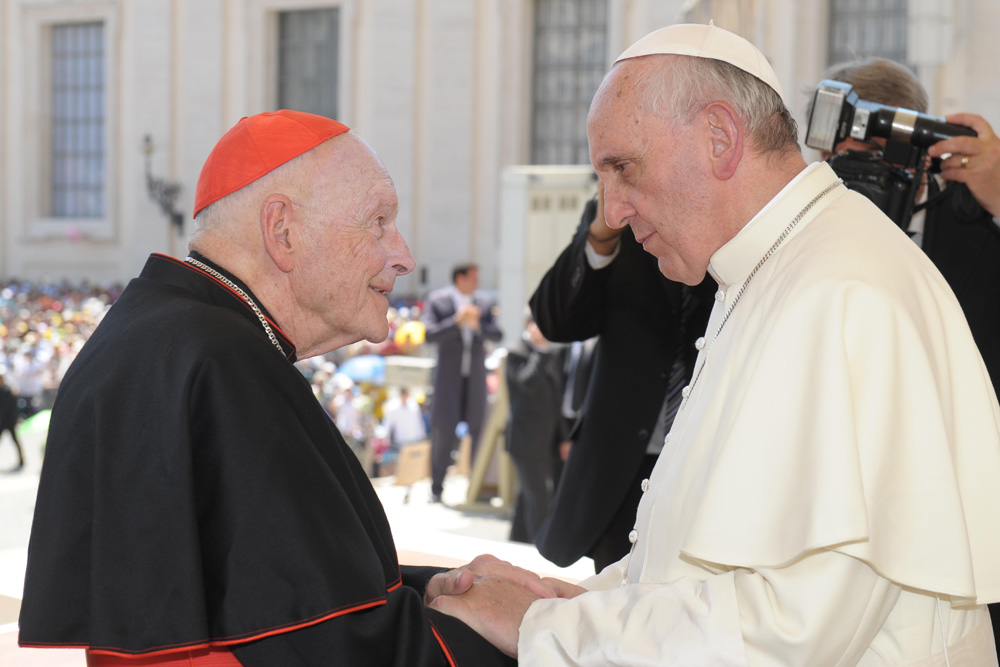
Pope Francis meets then-Cardinal Theodore McCarrick during his general audience at the Vatican June 19, 2013. (CNS/Vatican Media)
The other pivotal change Francis should make is to establish an independent criminal judiciary at the Vatican, superseding canon law tribunals, autonomous from the Roman Curia, to investigate and prosecute cardinals, bishops and religious order superiors.
As a sovereign monarch the pope has the power to authorize such a legal arena subject to rules of Western law. The church of Rome is already bowing to state and civil investigations; establishing its own court to oversee church officials would be proactive, and free Francis — and future popes — from having to intervene after the glacial pace of Vatican investigations, which draw on news reports and forensic findings of state investigations.
A group of Catholic constitutional lawyers could forge the bylaws while allowing the canonical system to do what it is designed to: maintain the administration of the church. Most important, an independent Vatican court, staffed with qualified investigators, would free the Holy Father to provide moral and spiritual leadership, without having to intervene each time scandals flare, letting justice proceed however long it takes to rid church officialdom of men dirty from cover-ups or sexual liabilities of their own.
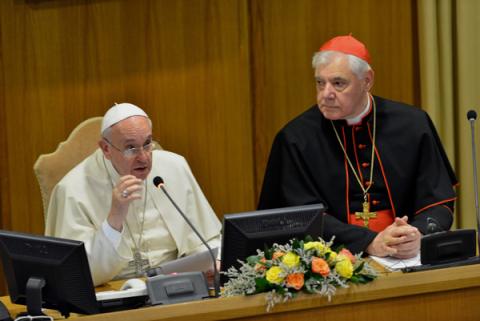
Pope Francis, seated next to Cardinal Gerhard Müller, prefect of the Vatican Congregation for the Doctrine of the Faith, discusses preservation of the family in Synod Hall at the Vatican Nov. 17, 2014, during the opening of a three-day interreligious conference on traditional marriage. (CNS/Chris Warde-Jones, courtesy Humanum.it)
Francis did approve a canon law tribunal to oversee bishops at Congregation for the Doctrine of the Faith; it was blocked by the former prefect, Cardinal Gerhard Müller, who, as a bishop, had shielded a predator back in Germany. Cardinals and bishops cannot police their own.
The Curia's cynicism undercuts the pope's role as a moral statesman on the world stage. Francis is a true voice of human rights, raising the issue of moral justice for Christians persecuted in the Middle East, and migrants seeking safe lives in the West. With Poland, Italy and Hungary in the grip of neo-fascist regimes, and Western stability threatened by Trump-inspired demagogues, demonizing migrants to further nationalism, Francis gives strength to the role of pope as advocate for peace. What other politician on the global stage is taking such stands?
On the abuse crisis, he is a work-in-progress.
John Paul was passive toward the evidence of criminal acts by priests and averse to punishing bishops. Canadian Bishop Hubert O'Connor of British Columbia resigned his office (but not his rank) in 1991; he did six months in prison after forcing a young First Nations seamstress he seduced and impregnated into a home for unwed mothers; the bishop changed the child's name on the birth certificate to conceal his paternity and made sure the baby was adopted. The conviction was reversed on a technicality; out of prison, he never held church office again. Of him, the Vatican and John Paul said not a word. Hubert O'Connor died a bishop.
Francis defrocked a Peruvian bishop for sexual abuse in 2013. Last year he defrocked two Chilean bishops for sexual abuse and accepted the resignations of seven others for concealing sex offenders. This happened after he defended a controversial bishop, Juan Barros, from "calumny."
The pope's remark ignited a media firestorm in Chile. Changing gears, Francis ordered a Vatican investigation of Chile's scandals; he spent long sessions at Casa Santa Marta with three Chilean abuse survivors. After the papal investigator, Archbishop Charles Scicluna delivered a 2300-page report, the nation's 31 bishops submitted their resignations. Barros' was one that Francis accepted.
As 24 Chilean bishops await word, a government investigation there bears down on two cardinals, once close to Francis, for allegedly concealing sex offenders: Ricardo Ezzati and his mentor, Francisco Javier Errázuriz Ossa.
"Two bishops kicked out of the priesthood – you never see that," says Juan Carlos Cruz, a former Chilean journalist, and nationally known survivor who spent years criticizing Barros for defending Cruz's perpetrator, Fernando Karadima, a Santiago pastor with a cult following.
"I get a call from the Vatican late last March, inviting me, and two friends also abused by Karadima, to a meeting at the Vatican. The pope issued a letter to the world saying he'd made grave mistakes and apologized. So we went. We stayed in Santa Marta [the papal residence.] Each of us had time with him. I stayed a week, spent three hours the first day by myself with him, telling him the reality I'd lived through. I wanted him to see me as the norm, not the exception for survivors. I didn't mince words. He was open-hearted. He told me he had been engañado, lied to, by bishops, especially Errázuriz, who was one of his original nine cardinal advisors. No longer."
Francis also defrocked Karadima.
"Chile needs to be a model, the norm, for how you deal with this culture of abuse and cover-up," Cruz says.
If Chile becomes the model, imagine America with the staggering volume of information disgorged by legal proceedings and the press, at BishopAccountability.org. How many facts does the pope need to sack the worst bishops? Archbishop Charles Scicluna of Malta, the foremost papal investigator, has countless roadmaps. Some cases are glaring. Why is Roger Mahony of Los Angeles, a catalyst in one of the worst debacles of the American church -- with proven cases of predators recycled under his watch -- still a cardinal? Why is John Nienstedt, the disgraced archbishop of St. Paul and Minneapolis, a ham-fisted cover-up artist, still a titular archbishop?
Why didn't Pope Benedict oust Mahony, or Frank Rodimer, the Patterson, New Jersey, bishop whose diocese paid $250,000 for his role in allowing Fr. Peter Osinski to molest a boy over the several summers they stayed down the hall from Rodimer's bedroom in the bishop's beach house? Osinski went to prison. Rodimer retired. He died at 91 in December 2018, a bishop in full standing.
If dispatching papal investigators to far-flung countries is the "new norm," then the pope looms as police chief over a scandal-saturated hierarchy whose support he needs in his efforts to shift the church's focus to radical mercy, embracing the fate of migrants, the injustices behind climate change and to foster a church ethos to welcome its alienated believers.
Cruz, a practicing Catholic, stated in May after staying at the papal residence, Francis told him: "Juan Carlos, it doesn't matter that you are gay. God made you that way and he loves you the way you are, and it doesn't matter to me. The pope loves you the way you are; you have to be happy with who you are."
Imagine the impact if those words were taught in Catholic schools.
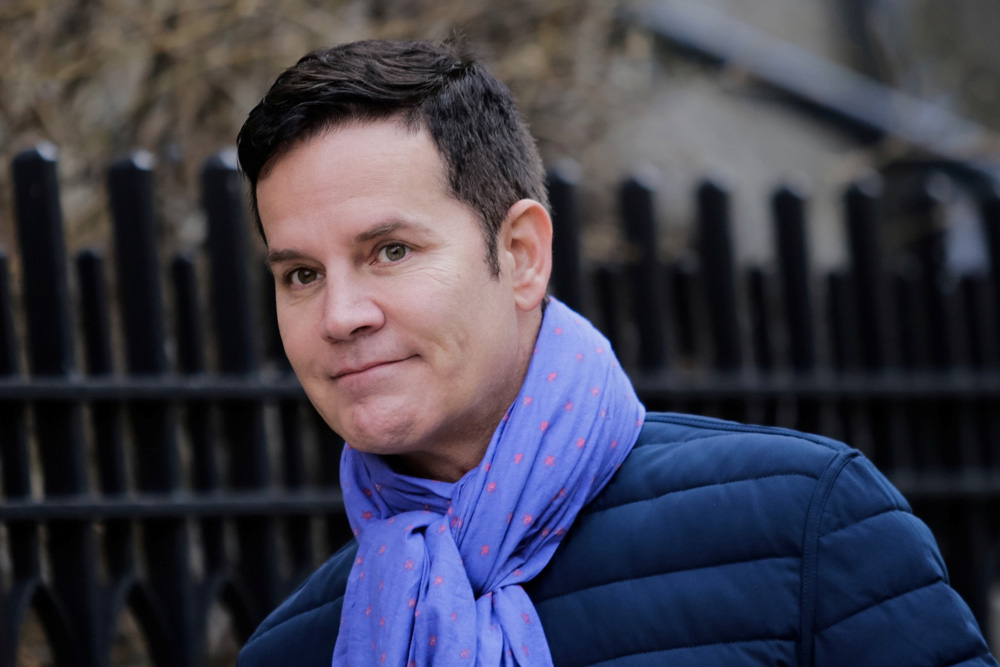
Juan Carlos Cruz smiles following a meeting with Archbishop Charles Scicluna of Malta, Italy, in late February 2018 at the Church of the Holy Name of Jesus in New York City. (CNS/Eduardo Munoz, Reuters)
The pope's big tent pastoral approach clashes with the ultra-conservatives' scapegoating of homosexual priests, ignoring female victims, documented cases of priests and bishops with female companions, and avoiding scrutiny of the clerical culture's varied sexual behavior patterns, as documented in the public record. Robert Sanchez resigned as archbishop of Santa Fe, New Mexico, in 1993 for seducing teenage girls. He became a prelate-without-portfolio, and died an archbishop in 2012.
The church's well-funded hard right, typified by the Napa Institute and Catholic League, resembles the "Knothead" camp from Love in the Ruins, Walker Percy's prophetic 1971 novel. "The American Catholic Church, which emphasizes property rights and the integrity of neighborhoods, retained the Latin mass and plays The Star-Spangled Banner at the elevation," of the host, wrote Percy, a convert who died in 1990.
As a substantial literature and years of news reporting have shown, the priesthood is a large closet, gay cliques abound, many with entrenched power. The issue is not that homosexuals are more apt to abuse youngster than heterosexuals, and certainly not that gay people are less spiritual or more immoral than straights, but how clericalism — a parallel world — circles the wagons for those inside of it. Many priests and Catholics who happen to be gay have watched the increased scrutiny of this reality for years without a rational forum for open discussion with petrified bishops and cardinals — witness the fusillades of hatred against Jesuit Father James Martin for his outreach to gays, acknowledging reality in a search for moral values. Now that ideological entrepreneurs of the Catholic right have made homosexual networks the hot-button issue, they turn the guns on Francis, who emerged from the 2013 conclave into the Roman Curia's sexual netherworld, for not rooting out the hypocrisy that escaped the probity of Benedict and John Paul for decades before him.
Advertisement
In a book just being published, In the Closet of the Vatican: Power, Homosexuality, Hypocrisy, Frédéric Martel writes, "Homosexuality is also one of the keys that explain the institutionalized cover-up of sexual crimes and misdemeanors, of which there are now tens of thousands. Why? How? Because the 'culture of secrecy', which was necessary to maintain silence about the huge presence of homosexuality inside the Church, has made it possible to hide sexual abuse, and for predators to benefit from this system of protection within the institution." Martel's book has no bibliography (a website referenced in galleys did not appear on Google as this story was published) and the overwhelming reliance on interviews, without citations of published works, is problematic. But the Roman Curia's hypocrisy on homosexuality has fed European media reports for years, making Martel's work important.
The American bishops' 2002 youth protection charter gave many dioceses a "zero tolerance" goal, which helped sensitize some bishops to settle cases, apologize and meet with survivors; the charter doesn't cover religious orders, nor does it contain oversight provisions for bishops, nor has it halted all of the brass-knuckle legal strategies.
How bishops think is a mystery still unraveling.
[Jason Berry is the author most recently of City of a Million Dreams: A History of New Orleans at Year 300.]




